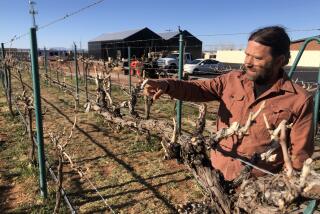Witness Testifies Banker Plotted More Loans for Iraq : Hearing: Former BNL official says the defendant was arranging billions for Baghdad arms purchases when federal agents shut down his operation.
A Georgia banker was plotting to arrange billions of dollars for Iraqi arms purchases when federal agents shut down his operation here in 1989, a former bank official testified Friday.
The testimony of Jean Ivey, a former official of the Banca Nazionale del Lavoro in Atlanta, provided the most in-depth evidence yet about branch manager Christopher P. Drogoul’s role in bankrolling Iraq’s military buildup before the Persian Gulf War.
Prosecutors contend that Drogoul was the mastermind behind $5 billion in hidden loans to Iraq by the BNL branch here. But his lawyers argue that Drogoul’s scheme was approved by his superiors in Rome and fit into U.S. policy of trying to appease Iraq in the prewar era.
Ivey was one of two bank employees who alerted federal authorities to the loan scheme in the summer of 1989. Occasionally she appeared on the verge of breaking down as she described going to authorities after Drogoul boasted that he was planning to help finance $6 billion to $7 billion in direct arms purchases by Baghdad.
A senior government investigator testified last week that BNL loans helped Iraq with some military projects.
The testimony came at the close of the second week of a sentencing hearing in federal court for Drogoul. The 43-year-old former manager of BNL’s branch here pleaded guilty in June to conspiracy, money laundering and other charges in connection with the scheme and faces a prison term of life without parole.
Drogoul is expected to take the stand when the hearing resumes Tuesday for his first explanation under oath of what happened.
In Washington, Rep. Henry B. Gonzalez (D-Tex.) released documents which he said showed that a $40-million smelting plant financed for Iraq by BNL was to be used for military purposes. Gonzalez said that the U.S. government allowed material for the plant to be shipped to Iraq, despite CIA knowledge that it was going to a major military facility.
According to Gonzalez, documents obtained by investigators for his House Banking, Finance and Urban Affairs Committee show that Iraq intended to use the plant to produce artillery shells and gun cartridges.
The plant was to be built by an Indianapolis company, SerVaas Inc. Equipment for the plant had been shipped to Iraq but not assembled when Iraq invaded Kuwait in August, 1990, and work was halted.
Beurt SerVaas, the company’s owner, testified before the Gonzalez committee last year that the plant was to be strictly commercial. He said the company had gone ahead with the contract only after ensuring it was for commercial uses.
SerVaas repeated on Friday that the plant he was building for Iraq was solely for commercial uses. “We have always viewed it as a classic swords into plowshares project, he said in a statement in which he also denied any dealings with Iraqi military.”
He also said the plant was never built and his company did not violate the law.
BNL’s loans to Iraq were concealed in records known as the “gray books,” which were hidden from BNL and federal auditors. Ivey, who received immunity from prosecution, acknowledged that she knew of the gray books and decided to leave the bank when the scheme got out of control.
She recounted a meeting at the bank’s offices here in the spring of 1989 in which she confronted Drogoul over the loans and warned him: “Peoples lives and careers are being ruined.”
According to Ivey, Drogoul took her to a coffee shop and tried to convince her that he had the situation under control. She said he took a piece of paper and drew three boxes representing his relationship with the Iraqis. One box was for the BNL loans for Iraqi food purchases guaranteed by the U.S. government; a second was for loans used by Iraq to buy machinery and other technology. The third box represented direct arms purchases for the Iraqis.
“They’re ready to enter the third box and do $6 (billion) or $7 billion in business,” Ivey said Drogoul told her.
She said the Iraqis planned to set up a new bank in London and funnel the arms money through that bank and BNL in Atlanta. Other witnesses have testified that the Iraqis had promised to make Drogoul head of the new bank if he got into trouble over the earlier loans to Baghdad.
A few weeks later, in late June, 1989, Ivey hired a lawyer and began negotiations with prosecutors for immunity in exchange for tipping them to the BNL scheme.
Ivey said prosecutors required her to continue working inside the bank while she was meeting with them at night to provide information on the scheme. She said that she was at the bank on Aug. 4, 1989, when a large team of federal agents barged through the double doors, ordered employees into a conference room and began seizing bank records.
Drogoul was in Paris at the time and records show that he flew immediately to London to confer with senior Iraqi officials about what to do. Prosecutors contend that the Iraqis told him to return to Atlanta and claim that the loans were proper.
Drogoul’s lawyer, Bobby Lee Cook, claims his client was operating with the knowledge of key BNL officials in Rome, an assertion that the government disputes and one that has not been supported so far by other witnesses.
Ivey testified Friday that she “felt” as though Rome officials had to be aware of the scheme, but she said she had no knowledge that they were.
More to Read
Start your day right
Sign up for Essential California for news, features and recommendations from the L.A. Times and beyond in your inbox six days a week.
You may occasionally receive promotional content from the Los Angeles Times.






